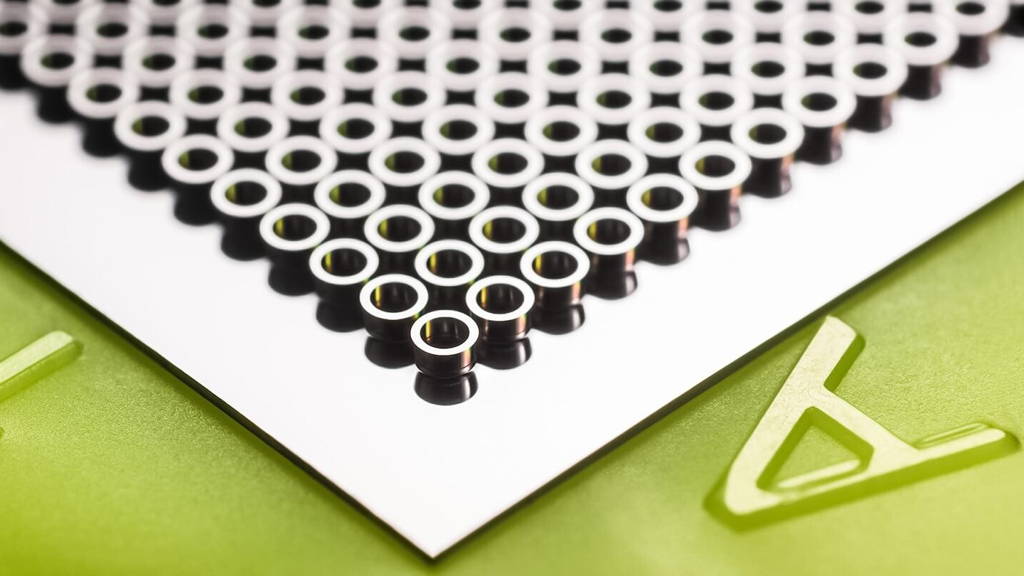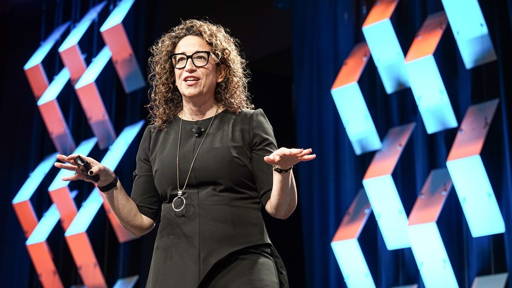The market for custom-made DNA has been around for decades, but is currently experiencing explosive growth due to the fact that massive DNA is used by drug developers and biology labs for gene therapy and creating new vaccines.
But the demand for DNA is much bigger, because companies like Microsoft investigate whether it is possible to use DNA as a super hard drive to store huge amounts of data. As it turns out, Microsoft bought 10,000 strands of modified DNA from Twist early this year.
Twist CEO Emily Leproust, PhD, says they didn't invent the process of writing custom DNA, they're applying a Silicon Valley mindset to making the process cheaper, easier, and more flexible than before. "We are an engineering company, not a chemistry company," says Leproust.
Twists top secret solution automates this process to a great extent with a machine that resembles a standard inkjet printer. Small ink tanks containing DNA bases can place the DNA in sequence as the customer ordered. When the nozzle passes over a wafer of silicon, it deposits approximately about 10,000 "blisters" of DNA bases every 21 minutes. As soon as the DNA is placed on the silicon wafer, it goes to a laboratory for final processing, so that it can be shipped out.
"It looks a bit like Kinko's, but it now costs $ 1 million each print and humanity will get better. With so much money involved, you have to work very carefully, you don’t want to put those millions to risk, "says Leproust.
Although Twist asks a lot of money for their product, it is only a third of what it used to cost according to Leproust. And the delivery is not weeks, but a few days. Customers can research and create new samples within a week.
Once the science allows it DNA is a wonderful means of storage. "You can put the entire internet in a shoebox," said Leproust. Research from Microsoft shows that one cubic millimetre of DNA can eventually store one Exabyte, or one billion Gigabytes of data. But the science is handicapped by the fact that it's tough to actually store that much data.
But the demand for DNA is much bigger, because companies like Microsoft investigate whether it is possible to use DNA as a super hard drive to store huge amounts of data. As it turns out, Microsoft bought 10,000 strands of modified DNA from Twist early this year.
Twist CEO Emily Leproust, PhD, says they didn't invent the process of writing custom DNA, they're applying a Silicon Valley mindset to making the process cheaper, easier, and more flexible than before. "We are an engineering company, not a chemistry company," says Leproust.
Waiting on DNA for months
Laboratories have been using machines to fabricate synthetic DNA since 1970. But this process was always quite time-consuming, slow and prone to errors. It is difficult for Microsoft for instance to experiment if you have to wait weeks and sometimes even months for your DNA to arrive.Twists top secret solution automates this process to a great extent with a machine that resembles a standard inkjet printer. Small ink tanks containing DNA bases can place the DNA in sequence as the customer ordered. When the nozzle passes over a wafer of silicon, it deposits approximately about 10,000 "blisters" of DNA bases every 21 minutes. As soon as the DNA is placed on the silicon wafer, it goes to a laboratory for final processing, so that it can be shipped out.
"It looks a bit like Kinko's, but it now costs $ 1 million each print and humanity will get better. With so much money involved, you have to work very carefully, you don’t want to put those millions to risk, "says Leproust.
More ideas than money
Many laboratories need custom DNA, for the testing of new vaccines for gene therapy or for developing new medicines. But because the process used to be so slow and expensive, they started looking for alternatives as cloning where the principle of customizing is completely gone, because you literally are making a copy. "They had more ideas than they had money," said Leproust.Although Twist asks a lot of money for their product, it is only a third of what it used to cost according to Leproust. And the delivery is not weeks, but a few days. Customers can research and create new samples within a week.
Readable for 10,000 years
Large companies such as banks and hospitals now save their data on old magnetic tapes, but these are due for replacement within 30 years, creating the possibility of losing years of data. DNA has tremendous potential in this field. DNA remains intact and readable for approximately 10,000 years.Once the science allows it DNA is a wonderful means of storage. "You can put the entire internet in a shoebox," said Leproust. Research from Microsoft shows that one cubic millimetre of DNA can eventually store one Exabyte, or one billion Gigabytes of data. But the science is handicapped by the fact that it's tough to actually store that much data.








